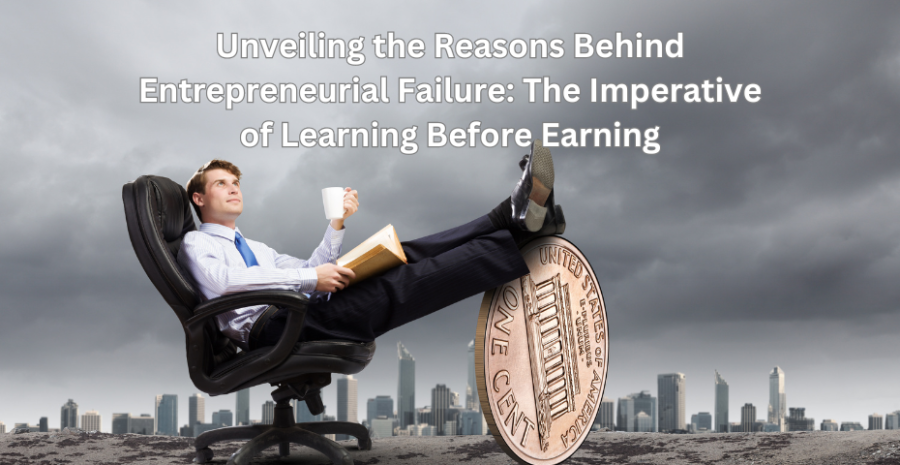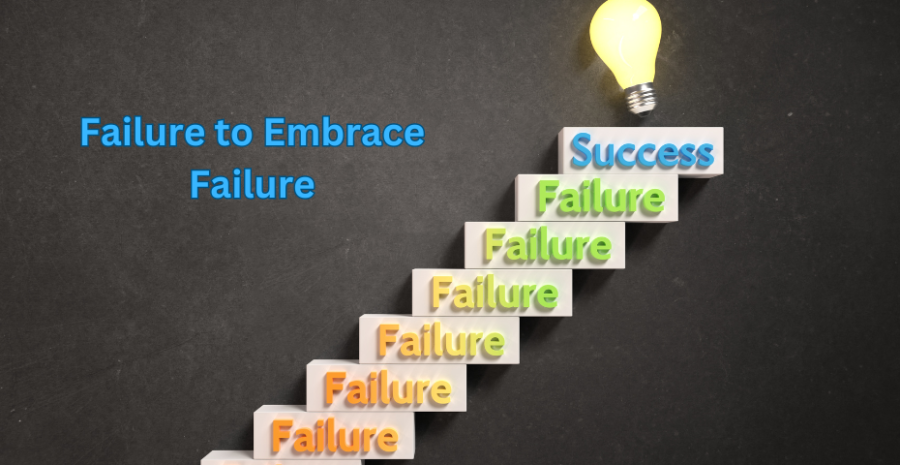
Unveiling the Reasons Behind Entrepreneurial Failure: The Imperative of Learning Before Earning.

Introduction:
Entrepreneurship is a journey marked by both triumphs and setbacks. While some entrepreneurs achieve remarkable success, many face failure along the way. Understanding why entrepreneurs fail and the importance of learning before earning is crucial for aspiring business owners.
In this blog, we'll explore the common reasons behind entrepreneurial failure and why continuous learning is essential for success in the dynamic world of business.
1. Lack of Market Understanding:
One of the primary reasons entrepreneurs fail is a lack of understanding of their target market. Without thorough market research, entrepreneurs may develop products or services that fail to resonate with consumers, leading to poor sales and eventual failure.
Lack of market understanding stands as a formidable barrier to entrepreneurial success, often leading to the demise of budding ventures. Entrepreneurs who fail to grasp the intricacies of their target audience's needs, preferences, and behaviors risk developing products or services that miss the mark.
Without conducting thorough market research and analysis, entrepreneurs may find themselves operating in a vacuum, unaware of the competitive landscape and the demands of their potential customers.
Consequently, their offerings may fail to resonate with the market, leading to dismal sales figures and eventual business failure. Understanding the market is not just about identifying a niche; it involves delving deep into consumer insights, industry trends, and competitive positioning. Entrepreneurs who overlook the importance of market understanding do so at their peril, as it is the foundation upon which successful business strategies are built.
2. Inadequate Planning and Execution:

Entrepreneurs often underestimate the importance of comprehensive planning and effective execution. Poorly developed business plans, coupled with a lack of follow-through, can result in missed opportunities and business failure.
Inadequate planning and execution serve as formidable obstacles on the path to entrepreneurial success, often leading to the downfall of ambitious ventures. Entrepreneurs who fail to meticulously plan their business endeavors, from defining clear objectives to outlining actionable strategies, risk navigating a rudderless ship in tumultuous waters.
Without a comprehensive roadmap in place, the journey towards achieving business goals becomes fraught with uncertainty and ambiguity. Moreover, even the most well-conceived plans are rendered ineffective without diligent execution. Entrepreneurs must possess the ability to translate their vision into tangible actions, consistently delivering on promises and milestones.
Failure to execute effectively can result in missed opportunities, inefficient resource allocation, and ultimately, the demise of the venture. It is imperative for entrepreneurs to prioritize strategic planning and disciplined execution, recognizing them as indispensable pillars of sustainable business growth and longevity.
3. Poor Financial Management:
Financial mismanagement is a significant contributor to entrepreneurial failure. Entrepreneurs who fail to budget effectively, manage cash flow, or secure adequate funding may find themselves unable to sustain their businesses in the long run.
Poor financial management represents a significant stumbling block on the path to entrepreneurial success, often leading to dire consequences for fledgling ventures. Entrepreneurs who neglect to maintain a firm grasp on their finances risk veering off course, with potentially catastrophic results.
From budgetary oversights to cash flow mismanagement, the ramifications of poor financial stewardship can reverberate throughout every aspect of the business. Without a sound financial strategy in place, entrepreneurs may find themselves unable to weather the inevitable storms of economic uncertainty or capitalize on growth opportunities.
Failure to track expenses, allocate resources judiciously, and monitor financial performance can quickly erode profitability and jeopardize the viability of the enterprise. In the dynamic landscape of entrepreneurship, astute financial management is not merely a desirable trait but an essential prerequisite for long-term sustainability and success.
4. Ineffective Marketing Strategies:

Successful businesses rely on robust marketing strategies to attract and retain customers. Entrepreneurs who neglect marketing or fail to reach their target audience may struggle to generate sales and compete in the marketplace.
Ineffective marketing strategies pose a formidable challenge for entrepreneurs striving for success, often leading to missed opportunities and diminished brand visibility. Entrepreneurs who fail to craft compelling marketing campaigns tailored to their target audience risk fading into obscurity amidst the competitive landscape.
Whether it's a lack of market research, inconsistent messaging, or inadequate promotional efforts, the repercussions of ineffective marketing can be far-reaching. Without a well-defined brand identity and strategic marketing plan, entrepreneurs may struggle to connect with their desired customer base and generate meaningful engagement.
Neglecting digital channels or overlooking emerging trends can further exacerbate the problem, limiting the reach and impact of marketing initiatives. In today's hyperconnected world, entrepreneurs must embrace innovative marketing strategies that resonate with their audience, fostering brand loyalty and driving sustainable growth.
5. Fierce Competition:
In today's competitive business landscape, entrepreneurs face fierce competition from both established companies and fellow startups. Failure to differentiate their offerings and carve out a unique value proposition can result in failure.
Fierce competition presents a formidable challenge for entrepreneurs, posing significant barriers to entry and survival in crowded markets. Entrepreneurs must navigate through a landscape saturated with competitors vying for the attention and patronage of consumers.
Failure to differentiate oneself and carve out a distinct niche can leave entrepreneurs struggling to gain traction and secure market share. Moreover, the rapid pace of technological advancements and globalization has intensified competition, requiring entrepreneurs to constantly innovate and adapt to stay ahead of the curve. In such a cutthroat environment, maintaining a competitive edge demands relentless dedication, creativity, and resilience.
Entrepreneurs who fail to recognize and effectively address the challenges posed by fierce competition risk being overshadowed by more agile and innovative rivals, jeopardizing their chances of long-term success in the marketplace.
6. Changing Consumer Preferences:

Consumer preferences are constantly evolving, driven by factors such as technological advancements, cultural shifts, and economic trends. Entrepreneurs who fail to adapt to these changes risk becoming irrelevant in the marketplace.
Changing consumer preferences present a formidable challenge for entrepreneurs, requiring them to adapt their products, services, and marketing strategies to meet evolving demands. In today's dynamic marketplace, consumer tastes and preferences can shift rapidly in response to a myriad of factors, including technological advancements, cultural shifts, and economic trends.
Entrepreneurs who fail to anticipate and respond to these changes risk falling out of sync with their target audience, diminishing the relevance and appeal of their offerings. Moreover, the rise of social media and online reviews has empowered consumers to voice their opinions and influence purchasing decisions, further complicating the landscape for entrepreneurs.
To navigate this complex terrain successfully, entrepreneurs must remain vigilant, proactive, and attuned to emerging trends, leveraging consumer insights to drive innovation and maintain relevance in the marketplace. Failure to do so may result in lost opportunities and dwindling market share, ultimately jeopardizing the long-term viability of the business.
7. Economic Uncertainties:
Economic downturns, recessions, and other external factors can significantly impact the success of a business. Entrepreneurs must be prepared to weather economic uncertainties and adapt their strategies accordingly.
Economic uncertainties pose a significant challenge for entrepreneurs, as fluctuating market conditions and unpredictable economic cycles can impact consumer spending, business investment, and overall demand.
Entrepreneurs operating in volatile economies must contend with factors such as inflation, interest rates, and geopolitical events, which can have far-reaching implications for their business operations. Uncertainty surrounding future economic conditions can lead to hesitancy among consumers and businesses, resulting in reduced purchasing power and decreased demand for goods and services.
Additionally, economic downturns can exacerbate challenges related to funding, cash flow, and access to capital, further complicating the entrepreneurial journey. To navigate these uncertainties successfully, entrepreneurs must adopt a proactive approach, diversify their revenue streams, and maintain financial resilience.
By staying agile, adaptable, and vigilant, entrepreneurs can mitigate the impacts of economic uncertainties and position their businesses for long-term success.
8. Insufficient Innovation and Adaptation:

Successful entrepreneurs are often characterized by their ability to innovate and adapt to changing circumstances. Those who become complacent or fail to embrace innovation risk being left behind by more agile competitors.
Insufficient innovation and adaptation represent significant hurdles for entrepreneurs, hindering their ability to stay relevant and competitive in dynamic market environments. Failure to innovate and adapt to changing consumer preferences, technological advancements, and industry trends can lead to stagnation and eventual obsolescence.
Entrepreneurs who rest on their laurels risk being overtaken by more agile and innovative competitors who are quick to embrace change and capitalize on emerging opportunities. Moreover, in today's fast-paced business landscape, the pace of innovation is relentless, requiring entrepreneurs to continually refine and enhance their products, services, and business processes.
Those who fail to do so may find themselves left behind, unable to meet the evolving needs and expectations of their customers. To thrive in such environments, entrepreneurs must foster a culture of innovation, encourage experimentation, and remain open to new ideas and perspectives. By embracing change and continuously adapting to market dynamics, entrepreneurs can position themselves for sustained success and growth.
9. Lack of Networking and Collaboration:
Networking and collaboration are vital components of entrepreneurial success. Entrepreneurs who fail to build meaningful relationships within their industry may miss out on valuable opportunities for growth and support.
Lack of networking and collaboration presents a formidable obstacle for entrepreneurs, hindering their ability to forge valuable connections, access resources, and seize opportunities for growth.
Entrepreneurs who operate in isolation risk missing out on valuable insights, mentorship, and support that can accelerate their business trajectory. Additionally, networking and collaboration enable entrepreneurs to tap into diverse perspectives, pool resources, and leverage collective expertise to overcome challenges and drive innovation.
Without a robust network of contacts and collaborators, entrepreneurs may struggle to navigate the complexities of the business landscape and gain a foothold in their respective industries. Moreover, in today's interconnected world, networking has become an essential aspect of entrepreneurship, facilitating partnerships, joint ventures, and strategic alliances that can unlock new markets and drive sustainable growth.
Therefore, entrepreneurs must prioritize building and nurturing relationships within their professional networks, fostering mutually beneficial partnerships that can propel their businesses forward.
10. Failure to Embrace Failure:

Failure is an inevitable part of the entrepreneurial journey. Entrepreneurs who fear failure or are unwilling to take risks may struggle to innovate and grow their businesses.
Failure to embrace failure represents a significant barrier for entrepreneurs, as it stifles innovation, risk-taking, and resilience in the face of adversity. Entrepreneurs who fear failure may hesitate to pursue bold ideas, explore new opportunities, or push the boundaries of their comfort zone, limiting their potential for growth and success.
However, failure is an inevitable part of the entrepreneurial journey and provides valuable lessons and insights that can inform future endeavors. By reframing failure as a stepping stone to success rather than a roadblock, entrepreneurs can cultivate a growth mindset, learn from their mistakes, and adapt their strategies accordingly.
Failure fosters resilience and perseverance, qualities that are essential for navigating the inevitable ups and downs of entrepreneurship. Therefore, rather than shying away from failure, entrepreneurs must embrace it as a natural and necessary part of the entrepreneurial process, using setbacks as opportunities for growth and development.
11. Resistance to Change and Growth:
Entrepreneurs must be open to change and willing to embrace new opportunities for growth. Those who resist change or become too attached to their initial ideas may find it challenging to adapt to evolving market conditions.
Resistance to change and growth poses a significant challenge for entrepreneurs, as it impedes their ability to adapt to evolving market dynamics and seize new opportunities.
Entrepreneurs who are resistant to change may cling to outdated business models, processes, or technologies, inhibiting innovation and hindering their competitiveness in the marketplace. Moreover, a reluctance to embrace growth can lead to complacency and stagnation, limiting the expansion and scalability of the business. However, in today's fast-paced and ever-changing business environment, the ability to embrace change and pursue growth is essential for long-term success.
Entrepreneurs must be willing to challenge the status quo, explore new ideas, and continually evolve their businesses to stay ahead of the curve. By cultivating a mindset of curiosity, adaptability, and continuous improvement, entrepreneurs can overcome resistance to change and position themselves for sustainable growth and success in the long run.
12. Ignoring the Importance of Continuous Learning:

Perhaps most importantly, entrepreneurs must recognize the importance of continuous learning. The business landscape is constantly evolving, and entrepreneurs who fail to update their skills, stay informed about industry trends, and seek out new knowledge may find themselves at a disadvantage.
Ignoring the importance of continuous learning presents a formidable obstacle for entrepreneurs, as it hinders their ability to stay relevant, innovative, and competitive in today's rapidly evolving business landscape. Entrepreneurs who fail to prioritize learning may miss out on valuable insights, trends, and developments that could inform their decision-making and drive business growth.
In industries where knowledge and skills become obsolete quickly, such as technology or finance, a lack of continuous learning can lead to obsolescence and irrelevance. However, embracing lifelong learning enables entrepreneurs to stay abreast of industry trends, acquire new skills, and adapt to changing market demands.
By investing in their personal and professional development, entrepreneurs can enhance their expertise, broaden their perspectives, and unlock new opportunities for success. Therefore, entrepreneurs must recognize the importance of continuous learning as a strategic imperative for staying competitive and thriving in today's dynamic business environment.
Conclusion:
Entrepreneurial failure is a common occurrence, but by understanding the reasons behind it and embracing a mindset of continuous learning, aspiring entrepreneurs can increase their chances of success. Learning before earning is not only a wise investment in one's business but also a fundamental requirement for navigating the challenges and opportunities of entrepreneurship.
By learning from past failures, staying adaptable, and committing to ongoing growth and development, entrepreneurs can position themselves for long-term success in the competitive world of business.
Understanding the underlying factors behind entrepreneurial failure underscores the imperative of learning before earning in the realm of entrepreneurship. By acknowledging and addressing these challenges head-on, aspiring entrepreneurs can equip themselves with the knowledge, skills, and mindset needed to navigate the complexities of the business landscape successfully.
Embracing failure as a valuable learning opportunity, fostering a culture of innovation and adaptation, and prioritizing continuous learning are essential strategies for mitigating the risks associated with entrepreneurship. Furthermore, recognizing the importance of networking, collaboration, and embracing change can help entrepreneurs overcome obstacles and seize opportunities for growth and success.
Ultimately, by learning from the mistakes of others and leveraging these insights to inform their own entrepreneurial journey, aspiring entrepreneurs can increase their chances of building resilient, thriving businesses.
With perseverance, resilience, and a commitment to lifelong learning, entrepreneurs can turn setbacks into stepping stones and realize their vision of entrepreneurial success.
.jpg)
About: Andries vanTonder
45 years selfemployed
He is a Serial Entrepreneur, an Enthusiastic supporter of Blockchain Technology and a Cryptocurrency Investor.
Find me: Markethive Profile Page | My Twitter Account | My Instagram Acount | and my Facebook Profile.
